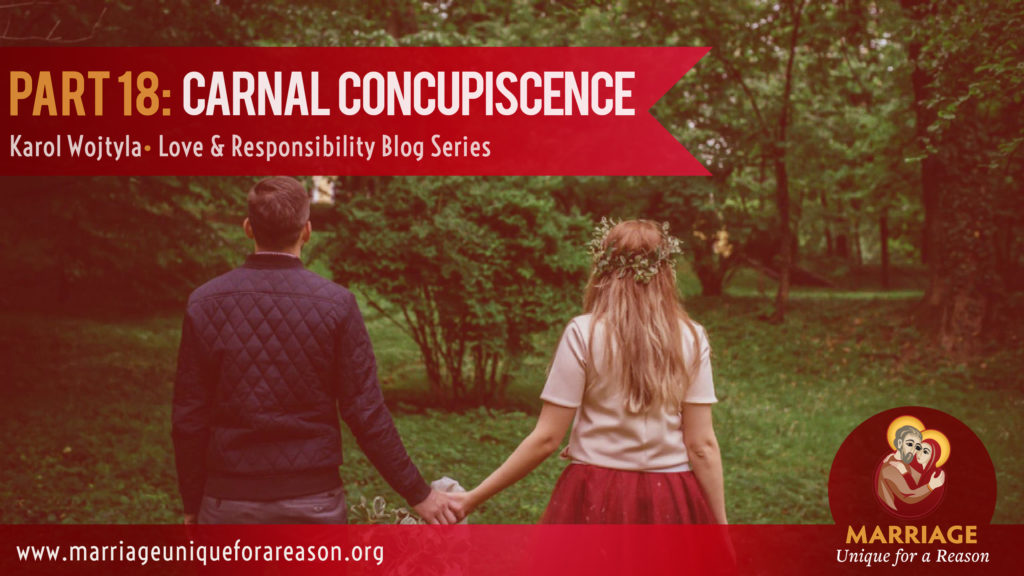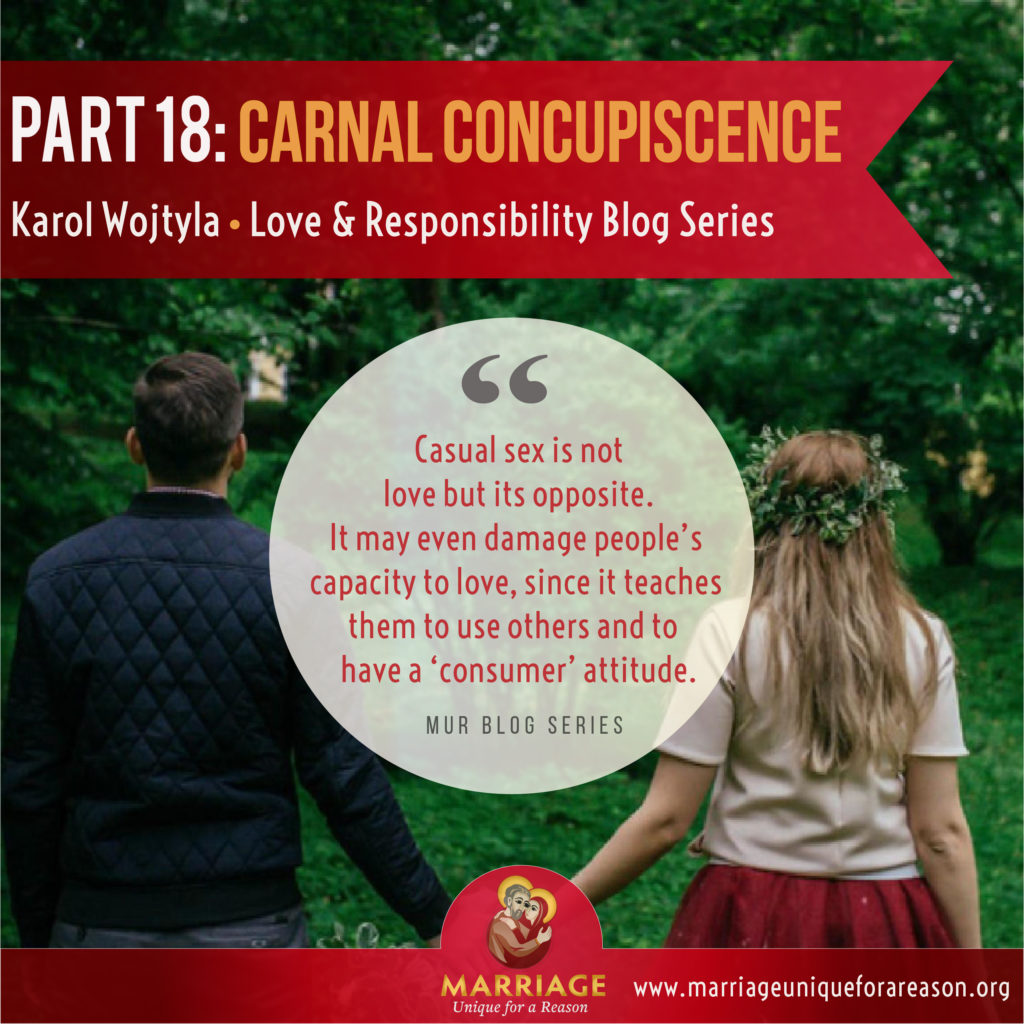Carnal Concupiscence: Love and Responsibility Series (Post #18)

What is Carnal Concupiscence?
Wojtyla begins this section on carnal concupiscence (Definition: the tendency toward sin in the area of sexuality) in Love and Responsibility by noting that, in the relationship between man and woman, the subject of an action is a person of one sex and the object is the other sex, and “only love blurs this relationship,”[i]—i.e. the two persons see each other as “another self,” and therefore not a totally separate individuals. Even if the two persons really do feel like a “we,” a joint, single subject, “This feeling, however, does nothing to alter the objective fact that they are in reality two different  beings and two different subjects of action,”[ii] Wojtyla writes. Often the actions of each person affect the other in a way that is more intense than in friendship or other more casual relationships. Wojtyla uses the word “actions” here to include thoughts and feelings which are “internal actions” only known to the person him- or herself.
beings and two different subjects of action,”[ii] Wojtyla writes. Often the actions of each person affect the other in a way that is more intense than in friendship or other more casual relationships. Wojtyla uses the word “actions” here to include thoughts and feelings which are “internal actions” only known to the person him- or herself.
Wojtyla turns to the Ten Commandments, pointing out that the two Commandments that have to do specifically with the relationship of the sexes cover both external actions (“Thou shalt not commit adultery”) and internal actions (“Thou shalt not covet thy neighbor’s wife”). In both cases, the object of the action is a person of the other sex. Carnal concupiscence, Wojtyla writes, is closely related to sensuality but it is not the same. Sensuality is the first reaction to a body of the other sex, as a possible “object of enjoyment,” but this reaction is not a sin. Concupiscence, like lust, is in the second movement—the movement of the will—to actively seek enjoyment out of the other person. The “obvious ease”[iii] by which a person moves from a reaction to this choice “is the source of great tensions in the inner life of the person,”[iv] Wojtyla writes.
Does Sex always = Love?
Sensuality easily turns into concupiscence or lust; the body’s reaction pushes the person in that direction. Wojtyla turns here to the famous philosopher and theologian St. Thomas Aquinas, who distinguishes these two movements of the soul as desire and the urge to act. Our feelings tend toward one or the other (thirst is an example of desire, anger of an urge to act). When sexual desire, focused solely on a body, is taken into the will and embraced, that is lust. The lustful person seeks bodily pleasure without regard to the  person. In such a case, as soon as this person achieves the bodily release that he or she craves, his or her attitude toward the other person changes completely. Consider one night stands as one clear way that this plays out in people’s lives. If Harry and Sally meet at a bar and “hook up,” it’s likely that Harry and Sally will look at each other very differently the next morning (or even just a short time later). “Sensuality is ‘expended’ in concupiscence,”[v] Wojtyla writes. If bodily desires are the only thing bringing two people together, and those desires are satisfied (at least temporarily) by the sexual act, then the two persons no longer have any reason to be together afterwards. This is normal in the animal world but a serious moral problem for human beings.
person. In such a case, as soon as this person achieves the bodily release that he or she craves, his or her attitude toward the other person changes completely. Consider one night stands as one clear way that this plays out in people’s lives. If Harry and Sally meet at a bar and “hook up,” it’s likely that Harry and Sally will look at each other very differently the next morning (or even just a short time later). “Sensuality is ‘expended’ in concupiscence,”[v] Wojtyla writes. If bodily desires are the only thing bringing two people together, and those desires are satisfied (at least temporarily) by the sexual act, then the two persons no longer have any reason to be together afterwards. This is normal in the animal world but a serious moral problem for human beings.
Lust, or carnal love, substitutes the body and sex for the person. The person is reduced to an object for use. The persons may feel love because of it— they may experience a powerful feeling of closeness and intimacy that comes from the release of hormones during sex—but this is a trick of nature. Lust drives people to have sex but it does not unite them as persons. Casual sex is not love but its opposite. It may even damage people’s capacity to love, since it teaches them to use others, to have a “consumer” attitude; to use and discard another human being.
Wojtyla notes that emotion (sentimentality) can act as one safeguard against carnal concupiscence or lust but it is not enough—the virtue of chastity is the only real security against being used and using others.
[i] Wojtyla, Karol. Love and Responsibility (San Francisco: Ignatius Press, 1993), p. 147.
[ii] Ibid, p. 147.
[iii] Ibid, p. 148.
[iv] Ibid, p. 148.
[v] Ibid, p. 149.
